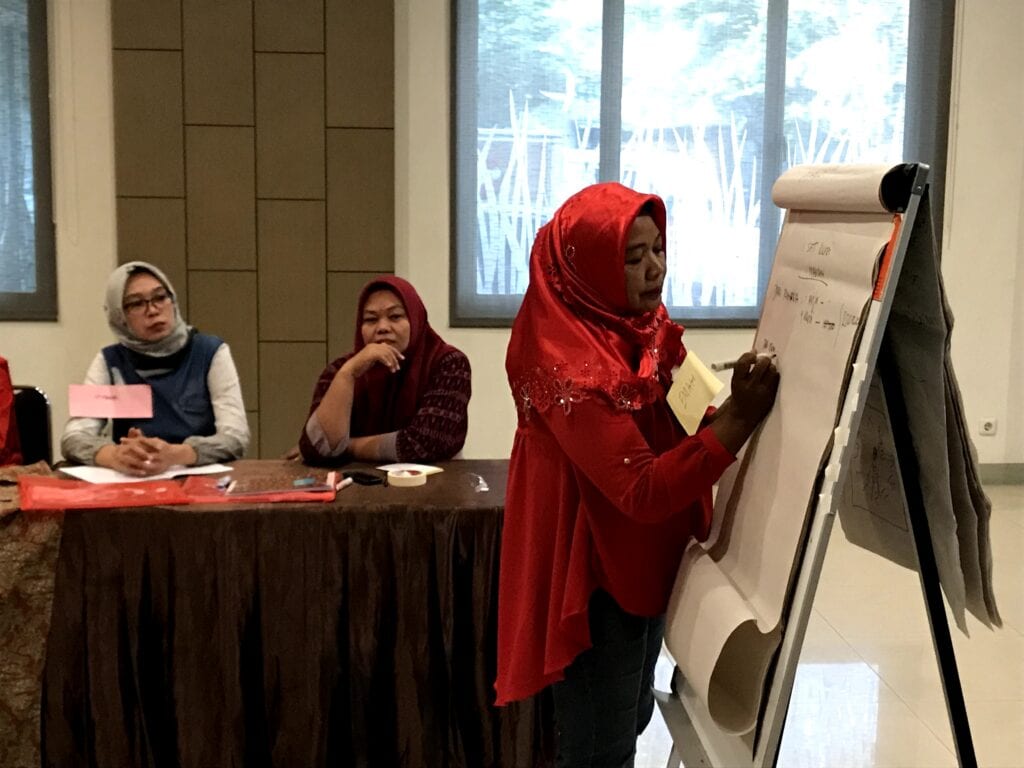4 min read
International funding to Indonesian non-government organisations (NGOs) has been declining over the past two decades, presenting challenges for the NGO sector. To respond to this, programs such as the National NGO Study and Service Centre (NSSC) and MAMPU by DFAT Australia were established to provide support to NGOs so they can work towards achieving financial independence, as donor assistance becomes more scarce.
As part of the MAMPU program, Kopernik has been working with several NGOs supporting women empowerment to explore alternative funding sources. Partners involved in the project included the Trade Union Rights Centre (TURC), Bina Keterampilan Pedesaan (BITRA) Indonesia, Yayasan Annisa Swasti (Yasanti), Bursa Pengetahuan Kawasan Timur Indonesia (BaKTI), Forum Pengada Layanan (FPL), Perempuan Sumatra Mampu (PERMAMPU) Consortium, ‘Aisyiyah’, Migrant CARE, and Lingkaran Pendidikan Alternatif untuk Perempuan (KAPAL Perempuan) Institute. During our work with these partners, we observed that there was an increasing interest from NGOs to transform themselves into social enterprises in order to diversify their funding sources.
As such, we have identified key steps required to turn business ideas into concrete action. The first step of the transformation into a social enterprise will be to explore suitable business models, which vary based on the type of organization. After these NGOs had identified and discussed business models, potential products and markets they could potentially tap into, they often struggled turning these ideas into reality. We, therefore, play the role of a ‘supporting force’ to enable and empower some of these initiatives. Three factors come into play that we have found necessary for NGOs to embark on the path towards becoming a social enterprise:
1. Strengthening Internal Management
After addressing necessary legal and administration requirements, NGOs may need to strengthen their internal management to prevent possible complications in operating their new business. The distribution of responsibilities among team members, in particular, will be important. For example, with TURC and their furniture business unit, we had found that there were too many members involved in the production of furniture and this needed to be addressed. Another issue identified was the profit-sharing arrangement which could hamper effective cooperation amongst members. As effective financial management and profit sharing are critical to any business operation, organisations are likely to need financial training to not only determine equitable arrangements and fairness for all, but also ensure healthy financial performance for the business over the longer term.
2. Establishing the Product and Identifying a Suitable Market
In addition to overcoming internal management issues, organizations will have to select or develop a product and/or service they wish to offer. Some organizations may already have a clear business proposition, while others may need further support in identifying or enhancing their existing or potential assets. For example, Kopernik supported FPL to identify their prospective services, which resulted in developing a consultancy service on gender-based issues.
A useful exercise will be to reflect on existing internal capabilities and past experiences, and creatively synthesize various resources into a concrete and attractive offer for the market. Developing several products and services can bring more opportunities to engage potential clients, as a means to test potential demand as well as responding to market trends and needs.
3. Sharpening Business Acumen
In addition to proposing a distinctive product, it is essential for organizations to develop their business acumen and capacity to sustain their enterprise. One of the commonly observed gaps was the ability to determine the organization’s commercial value, which made it challenging to determine an appropriate fee for their products/services. In our experience in supporting our partners, we have found that an analysis of potential competitors providing similar offers, combined with discussions with potential clients on their willingness to pay proved successful.
These three factors are key for early-stage social enterprises to not only secure alternative funding sources, but also ensure that they can continue to operate and support the communities whom they work with.
The COVID-19 context has forced NGOs and companies alike to re-think and pivot their operations, whilst seeking collaboration opportunities. During the pandemic, more businesses and NGOs have transitioned and moved their activities online. This includes their internal communications as well as to promote their products and services online.
While the capacities outlined above will not be achieved overnight, the shared goals between Kopernik and MAMPU Partners, alongside their willingness to try new approaches have enabled us to jointly test innovative approaches to strengthen business models and pitches to potential clients. Based on these partnerships, we believe there is a great window of opportunity to support NGOs in their transition into social enterprises.


















